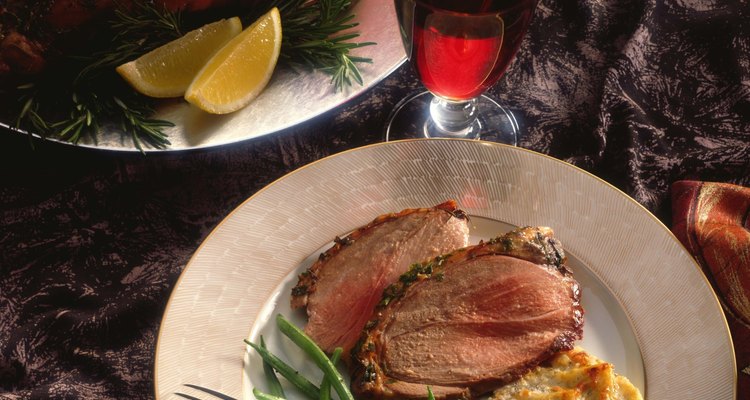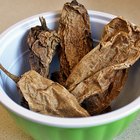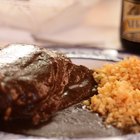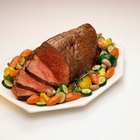
Demi-glace is a thick and intensely flavored brown liquid that is both a sauce itself, and -- as it is more often used -- a sauce base. There are many differing opinions on the ingredients and methods for making demi-glace, but typically all these recipes use a combination of a heavily reduced meat stock that is often flavored with table wine or Madeira. Often prized as a flavorful thickener for savory sauces and for adding a rich, hearty depth to finished dishes, demi-glace is also great at deglazing a pan.
Stand-Alone Sauce
Demi-glace has a wonderfully rich and intensely meaty flavor, and can stand alone as a sauce. Dishes with strong savory flavors tend to hold up best to -- and complement -- stand-alone demi-glace. Consider serving it with rich, meaty dishes like prime rib of beef, whole roasted leg of lamb and roasts of game like venison, elk, moose, bear or kangaroo.
Deglazing a Pan
Another way to use demi-glace is to deglaze cooking pans. Deglazing refers to the technique of pouring liquid into a hot pan to loosen up the intensely-flavored “brown bits” left over in a pan after cooking meat, which can easily be reduced into a pan sauce. Pan sauces are generally very simple sauces to make as they typically involve nothing more than whisking the brown bits into the deglazing liquid in the pan and reducing the liquid for a few minutes until thickened to a sauce consistency. One benefit of using demi-glace to deglaze a pan is that since demi-glace is already very thick itself, the pan sauce does not need to thicken in the pan for very long at all. However, demi-glace is often too thick to be used as a deglazing liquid by itself. Rather, demi-glace is often added to the pan along with other flavorful liquids to make a rich and pan sauce. Demi-glace, along with brandy, port or red wine, make an excellent pan sauce to serve with beef and bison steaks, lamb chops and ostrich filets. Classic French dishes using this technique include Steak Diane and Steak Au Poivrade.
Compound Sauces
Demi-glace is very often used as a sauce base, rather than a stand-alone sauce itself. Called by Julia Child “the traditional mother of the brown sauces,” demi-glace both flavors and thickens many classical French sauces including Sauce Bordelaise -- a red wine sauce typically flavored with shallot, thyme and sometimes bone marrow -- and Sauce Robert -- a white wine and mustard sauce often flavored with chopped onion and sometimes pepper and vinegar.
Storing and Reusing Demi-Glace
Making traditional demi-glace can be a very time consuming process, so many chefs prefer to make a large amount at once -- the reasoning being that the effort involved in making doesn't change much regardless of how much the chef chooses to make. Demi-glace will keep in your refrigerator for about two weeks. It can also be frozen for up to six months. One way to freeze demi-glace for easy later use is to pour the finished -- and cooled -- sauce into ice trays and freeze them. Then remove the demi-glace “ice cubes” from the ice trays and store in freezer bags in your freezer. The frozen cubes can then be dropped into sauces and recipes as needed from your freezer.
Related Articles

How to Make Chipotle Sauce

The History of Bearnaise Sauce

How to Cook Bear Steaks

The Best Way to Prepare Bison Sirloin

How to Make Cayenne Pepper Sauce

How to Pan Sear a Marinated Flank Steak

What Is Mole & How Is it Used in ...

How to Slow Cook Brisket With Brown ...

How to Make Prosecco Sauce

Bratwurst Spices

How to Make Fish Taco Sauce

How to Tone Down Spiciness in BBQ Sauce

How to Cook Dominican-Style Steak

How to Make a Blackbuck Antelope Roast

Can Chuck Roast Be Used for Stew?

Tri Tip Cooking Methods
What Can I Make With Cajun Pork Tasso?

How to Marinate Meatballs

The Ingredients in Chipotle Sauce

Grilling a Top Sirloin Filet in a Cast ...
References
- Saveur: Homemade Demi-Glace
- Le Cordon Bleu Complete Cooking Techniques, Jeni Wright and Eric Treuille, pg 224
- Mastering the Art of French Cooking (2009 ed.), Julia Child et al
- LaRousse Gastronomique, Prosper Montagne
Writer Bio
Kurt Schrader has been writing professionally since 2005. He has also worked in the hospitality and travel industries for more than 10 years. Schrader holds a bachelor's degree in management, a master's degree in information studies and a Juris Doctor from Florida State University.
Photo Credits
Jupiterimages/Stockbyte/Getty Images